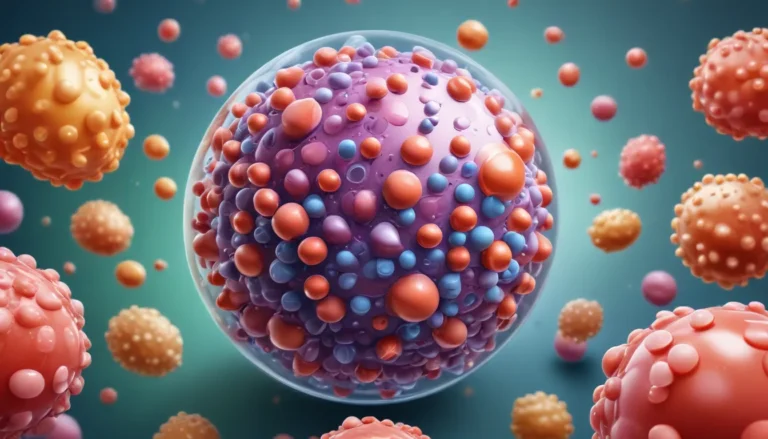A Note About Images: The images used in our articles are for illustration purposes only and may not exactly match the content. They are meant to engage readers, but the text should be relied upon for accurate information.
Are you ready to uncover the hidden secrets of reaction intermediates? These elusive chemical species play a crucial role in the world of chemistry, acting as the bridge between reactants and products during a reaction. In this article, we will dive into the fascinating realm of reaction intermediates and explore 20 surprising facts that will captivate both chemistry enthusiasts and professionals alike. From their diverse forms to their impact on reaction mechanisms and biological significance, get ready to unravel the mysteries surrounding these essential chemical entities.
Understanding Reaction Intermediates: The Key to Complex Chemical Reactions
Reaction intermediates are transient species that form during a chemical reaction and play a vital role in the conversion of reactants into products. Acting as intermediaries between the starting materials and the final outcome, these elusive entities help facilitate the reaction process and provide valuable insights into reaction mechanisms.
Diverse Forms of Reaction Intermediates
Reaction intermediates can exist in various forms, including ions, radicals, or molecules with high energy and unstable characteristics. These transient species are often short-lived and undergo further reactions to yield the desired products, showcasing the dynamic nature of chemical transformations.
Influence of Reaction Conditions on Intermediate Formation
The formation and stability of reaction intermediates are often influenced by factors such as temperature, pressure, catalysts, and reactant concentration. By manipulating these conditions, scientists can alter the reaction pathway and achieve different outcomes, highlighting the versatile nature of these critical species.
Unveiling the Secrets of Reaction Mechanisms
Studying reaction intermediates allows chemists to unravel the step-by-step progression of a chemical reaction. By identifying and characterizing these species, scientists can gain a deeper understanding of complex reactions and develop more efficient strategies for synthesis, opening up new possibilities in the world of chemistry.
The Role of Transition States in Chemical Reactions
Transition states, a type of reaction intermediate, are high-energy species that exist temporarily during a reaction. Characterized by partial bonds and distorted molecular geometries, these critical entities represent the highest energy point along the reaction pathway, shedding light on the intricacies of chemical transformations.
Detection and Analysis of Reaction Intermediates
Various spectroscopic techniques, such as infrared spectroscopy, nuclear magnetic resonance (NMR), and mass spectrometry, can be utilized to detect and analyze reaction intermediates. These methods provide valuable information about the structure, composition, and behavior of these elusive species, enabling in-depth exploration of their properties.
Unique Reactivity and Selectivity of Reaction Intermediates
Certain reaction intermediates exhibit specific reactivity towards functional groups or classes of compounds, showcasing unique selectivity that can be harnessed in organic synthesis. This selective nature allows for highly specific and controlled transformations, revolutionizing the field of chemical synthesis.
The Significance of Radicals as Reaction Intermediates
Radicals, highly reactive species with unpaired electrons, are common reaction intermediates that play a crucial role in organic and polymerization reactions. Initiating and propagating chain reactions, radicals contribute to the diverse array of products that can be formed through chemical transformations.
Stabilization of Intermediates Through Catalyst Coordination
Catalysts can interact with reaction intermediates, modifying their electronic properties and stabilizing them, thereby facilitating the formation of new bonds and accelerating the overall reaction rate. This coordination between catalysts and intermediates highlights the essential role of catalysts in chemical reactions.
Acid-Base Reactions and Intermediate Formation
Proton transfer reactions, also known as acid-base reactions, often involve the formation of reaction intermediates. These transient carriers of protons play a key role in the transformation of reactants into products, showcasing the dynamic nature of chemical reactions.
Structural Rearrangements of Reaction Intermediates
During a reaction, intermediates may undergo structural rearrangements, leading to the formation of different products. These rearrangements can occur through the migration of atoms or groups within the intermediate molecule, highlighting the versatility of chemical transformations.
Isolation and Characterization of Reaction Intermediates
Under specific reaction conditions, some reaction intermediates can be trapped or selectively formed, allowing for their isolation and characterization. This in-depth study of intermediates provides a deeper understanding of their properties, behavior, and potential applications in chemical reactions.
Unique Electronic Configurations of Reaction Intermediates
Due to their high energy and unstable nature, reaction intermediates often exhibit unusual electronic structures, such as radical character or partial charges. These electronic features contribute to their distinct reactivity, shaping the outcome of chemical reactions.
Exploring Multiple Reaction Pathways of Intermediates
Depending on the reaction conditions and reactant nature, reaction intermediates may follow different pathways, leading to the formation of diverse products. Understanding the factors that control these pathways is essential for optimizing reactions and achieving desired outcomes.
Autocatalysis: Intermediates as Catalysts Themselves
In certain reactions, reaction intermediates can act as catalysts, facilitating the conversion of reactants into products. This phenomenon, known as autocatalysis, leads to self-amplifying reaction cycles, highlighting the diverse roles intermediates can play in chemical transformations.
Organic Chemistry and the Role of Reaction Intermediates
Organic chemistry heavily relies on reaction intermediates, as they are essential for the synthesis of complex organic molecules. Understanding the behavior of intermediates is crucial for designing efficient synthetic routes and developing innovative chemical processes.
Solvent Effects on Reaction Intermediates
The choice of solvent significantly impacts the stability and reactivity of reaction intermediates. Variations in solvent properties can solvate intermediates differently, leading to differences in reaction rate and selectivity, shaping the outcome of chemical transformations.
Radical Reactions: Formation of Intermediate Radicals
Radical reactions involve the generation of reactive intermediates called radicals, which have unpaired electrons and exhibit unique reactivity. This distinct reactivity allows for the formation of diverse products, showcasing the versatility of radical intermediates in chemical reactions.
Biological Significance of Reaction Intermediates
In biochemical reactions, reaction intermediates play crucial roles in the synthesis of biomolecules and the functioning of enzymes. Understanding these intermediates is essential for unraveling biological processes and gaining insights into the intricate mechanisms of life.
Unlocking Complex Reaction Networks with Intermediates
Many chemical reactions involve intricate networks of intermediates and transition states. Analyzing the behavior and interactions of these critical species provides valuable insight into the overall reaction mechanism, shedding light on the complexity of chemical transformations.
Conclusion: Embracing the Dynamic World of Reaction Intermediates
In conclusion, reaction intermediates are a dynamic and indispensable aspect of chemical reactions. From their formation to their role in guiding reaction mechanisms and controlling selectivity, these critical species hold the key to unlocking the secrets of chemical transformations. By delving into the realm of reaction intermediates, scientists and enthusiasts alike can gain a deeper appreciation for the complexity and beauty of chemistry, paving the way for innovative discoveries and advancements in the field.
FAQs: Unveiling the Mysteries of Reaction Intermediates
Q: What is a reaction intermediate?
A: A reaction intermediate is a short-lived species that forms during a chemical reaction and exists between the initial reactants and final products.
Q: How are reaction intermediates detected?
A: Reaction intermediates can be detected through various techniques such as spectroscopy, chromatography, and computational methods.
Q: Why are reaction intermediates important?
A: Reaction intermediates are important because they help explain reaction mechanisms, guide the development of new synthetic routes, and provide insights into biological processes.
Q: Can reaction intermediates be isolated and studied?
A: In some cases, reaction intermediates can be isolated and studied using specialized techniques. However, due to their highly reactive nature, many intermediates are difficult to isolate and study directly.
Q: Are all reactions accompanied by the formation of reaction intermediates?
A: Not all reactions involve the formation of reaction intermediates. Some reactions proceed through a single-step mechanism, while others involve the formation of multiple intermediates.
Q: Can reaction intermediates impact the selectivity of a reaction?
A: Yes, reaction intermediates can influence the selectivity of a reaction by favoring the formation of certain products over others. Understanding the nature of intermediates can provide insights into controlling reaction outcomes.
Q: Can reaction intermediates be utilized in practical applications?
A: Absolutely! Reaction intermediates can be harnessed for various practical applications, such as developing new catalysts, designing more efficient chemical processes, and synthesizing complex molecules.
Unravel the mysteries surrounding reaction intermediates and embark on a journey of discovery as you explore the captivating world of chemical transformations. By understanding the role of reaction intermediates in guiding complex reactions, we can unlock new possibilities and drive innovation in the field of chemistry. Let the dynamic and intriguing nature of reaction intermediates inspire you to delve deeper into the fascinating realm of chemical processes and uncover the secrets that shape our understanding of the world around us.






